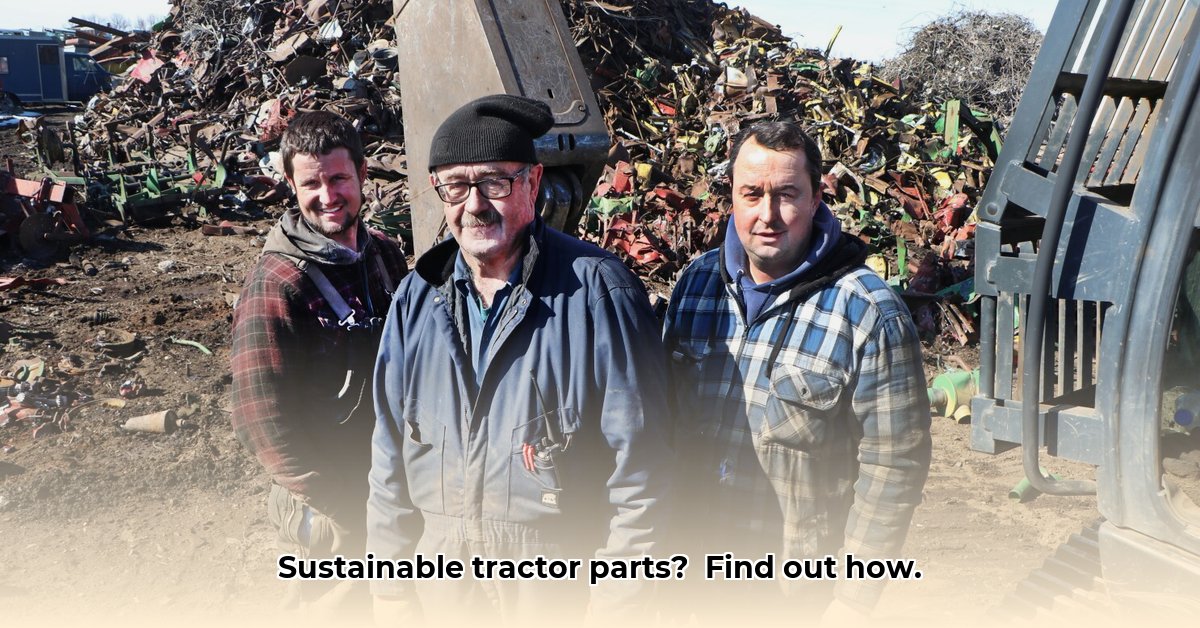
Meyers Tractor Salvage Aberdeen SD: A Case Study in Sustainable Parts
Meyers Tractor Salvage (MTS) in Aberdeen, South Dakota, occupies over 100 acres brimming with used and new farm equipment parts. This presents a significant opportunity to foster more environmentally friendly farming practices through parts reuse, reducing both environmental impact and farmers' costs. However, a review of MTS's current operational model reveals areas needing improvement to fully realize this potential. Can MTS leverage its existing resources to become a leader in sustainable agricultural practices? This case study explores the challenges and opportunities facing MTS, offering a roadmap for sustainable growth. For a wider selection of used farm equipment, check out this website.
Assessing MTS's Current Sustainability Profile
Customer feedback reveals inconsistencies in service and order fulfillment, impacting online ratings. This negatively affects reputation and hinders growth, especially amongst environmentally conscious farmers. Furthermore, MTS has not actively promoted its sustainability efforts, missing an opportunity to attract a key market segment. How can a business built on reuse effectively communicate its environmental benefits? This oversight needs urgent attention.
Key Findings:
- Negative customer reviews highlight issues with customer service and order fulfillment.
- MTS lacks a formal, publicized sustainability plan.
- The current operational model fails to capitalize on the significant potential for environmental and economic benefits through parts reuse.
A Roadmap to a Greener MTS: Practical Steps for Success
To achieve sustainable growth, MTS requires a strategic overhaul focused on improving customer experience and formalizing a commitment to environmental responsibility. This involves three key steps:
1. Prioritize Customer Satisfaction: Addressing negative online reviews is paramount. Implementing clear communication protocols, ensuring reliable shipping, and establishing rigorous quality control measures are essential for building customer trust – crucial for long-term sustainability. This foundational step directly impacts the success of subsequent sustainability initiatives. A 90% satisfaction rating is a realistic short-term goal.
2. Formalize a Commitment to Sustainability: Developing a comprehensive, written sustainability plan is crucial. This should include:
- Waste Reduction: Implement a robust recycling program for scrap metal, fluids, and other materials. This not only reduces environmental impact but also creates potential revenue streams through responsible material recovery.
- Strategic Partnerships: Collaborate with local or national environmental organizations to enhance credibility, gain expertise, and expand marketing reach.
- Eco-Friendly Shipping Practices: Explore options to minimize carbon emissions, such as using recycled packaging or partnering with environmentally conscious carriers.
- Industry Certification: Aspire towards certifications like ISO 14001 (an international standard for environmental management) to demonstrate commitment and build consumer trust. This certification will provide third-party validation of MTS's sustainability efforts.
3. Enhance Customer Engagement and Education: Actively communicate the cost savings and environmental benefits of buying used parts. This requires a user-friendly website with advanced search capabilities, showcasing the breadth of MTS's inventory and its commitment to sustainable practices.
The Bigger Picture: Economic and Environmental Synergies
MTS's success extends beyond local impact; it's about contributing to a more sustainable agricultural future. Government incentives for eco-friendly businesses and policies supporting the secondary market for farm equipment can create a more favorable economic climate. Similarly, environmental groups can play a role by promoting successful sustainability models like MTS (once the necessary improvements are implemented). The potential for positive environmental and economic impact is substantial. How can these external stakeholders further support MTS's growth?
Actionable Steps for Stakeholders
This table outlines concrete steps for various stakeholders to support a greener MTS, highlighting the collaborative effort required to achieve lasting change.
| Stakeholder | Short-Term Goals (0-1 year) | Long-Term Goals (3-5 years) |
|---|---|---|
| MTS Management | Implement improved customer service protocols; address negative reviews; initiate a basic waste recycling program. | Fully implement a comprehensive sustainability plan; obtain ISO 14001 certification; explore carbon-neutral shipping. |
| Farmers/Ranchers | Increase purchase of refurbished parts; actively research sustainable farming practices. | Advocate for government policies; share success stories of using recycled parts. |
| Government Agencies | Offer financial incentives; simplify regulations for recycled part acquisition. | Invest in research on the environmental benefits of reusing farm equipment. |
| Environmental Groups | Promote MTS; partner with MTS on educational outreach and sustainability initiatives. | Conduct research measuring the environmental impact of equipment reuse. |
Conclusion: A Sustainable Future for Agriculture
Meyers Tractor Salvage has immense potential to lead the agricultural sector towards greater sustainability. By implementing the strategies outlined above, MTS can enhance profitability while making a significant contribution to environmental protection. The transformation of MTS into a model of sustainable business practice will benefit not only the company but also the wider agricultural community and the planet.